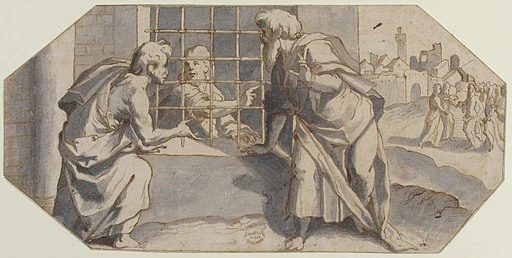1
At nangyari, na nang matapos nang masabi ni Jesus ang kaniyang mga utos sa kaniyang labingdalawang alagad, ay umalis siya roon upang magturo at mangaral sa mga bayan nila.
2
Nang marinig nga ni Juan sa bilangguan ang mga gawa ni Cristo, ay nagpasugo siya sa pamamagitan ng kaniyang mga alagad,
3
At sinabi sa kaniya, Ikaw baga yaong paririto, o hihintayin namin ang iba?
4
At sumagot si Jesus at sa kanila'y sinabi, Magsiparoon kayo at sabihin ninyo kay Juan ang mga bagay na inyong nangaririnig at nangakikita:
5
Ang mga bulag ay nangakakakita, ang mga pilay ay nangakalalakad, ang mga ketongin ay nangalilinis, at ang mga bingi ay nangakaririnig, at ang mga patay ay ibinabangon, at sa mga dukha ay ipinangangaral ang mabubuting balita.
6
At mapalad ang sinomang hindi makasumpong ng anomang katitisuran sa akin.
7
At samantalang ang mga ito'y nagsisiyaon ng kanilang lakad, ay nagpasimula si Jesus na magsalita sa mga karamihan tungkol kay Juan, Ano ang nilabas ninyo upang masdan sa ilang? isang tambo na inuuga ng hangin?
8
Datapuwa't ano ang nilabas ninyo upang makita? isang taong nararamtan ng mga damit na maseselan? Narito, ang mga nagsisipanamit ng maseselan ay nangasa mga bahay ng mga hari.
9
Datapuwa't ano ang nilabas ninyo? upang makita ang isang propeta? Oo, sinasabi ko sa inyo, at lalo pang higit kay sa isang propeta.
10
Ito yaong tungkol sa kaniya'y nasusulat, Narito, sinusugo ko ang aking sugo sa unahan ng iyong mukha, Na maghahanda ng iyong daan sa unahan mo.
11
Katotohanang sinasabi ko sa inyo, Sa gitna ng mga ipinanganganak ng mga babae ay walang lumitaw na isang dakila kay sa kay Juan Bautista: gayon man ang lalong maliit sa kaharian ng langit ay lalong dakila kay sa kaniya.
12
At mula sa mga araw ni Juan Bautista hanggang ngayon, ang kaharian ng langit ay nagbabata ng karahasan, at kinukuha nang sapilitan ng mga taong mararahas.
13
Sapagka't ang lahat ng mga propeta at ang kautusan hanggang kay Juan ay nagsipanghula.
14
At kung ibig ninyong tanggapin, ay siya'y si Elias na paririto.
15
Ang may mga pakinig upang ipakinig, ay makinig.
16
Datapuwa't sa ano ko itutulad ang lahing ito? Tulad sa mga batang nangakaupo sa mga pamilihan, na sinisigawan ang kanilang mga kasama.
17
At sinasabi, Tinutugtugan namin kayo ng plauta, at hindi kayo nagsisisayaw; nagsipanambitan kami, at hindi kayo nangahapis.
18
Sapagka't naparito si Juan na hindi kumakain o umiinom man, at sinasabi nila, Siya'y mayroong demonio.
19
Naparito ang Anak ng tao na kumakain at umiinom, at sinasabi nila, Narito, ang isang matakaw na tao at isang manginginom ng alak, isang kaibigan ng mga maniningil ng buwis at ng mga makasalanan! At ang karunungan ay inaaring-ganap ng kaniyang mga gawa.
20
Nang magkagayo'y kaniyang pinasimulang sumbatan ang mga bayan na pinaggagawan niya ng lalong marami sa kaniyang mga gawang makapangyarihan, sapagka't hindi sila nangagsisi.
21
Sa aba mo, Corazin! sa aba mo, Bethsaida! sapagka't kung sa Tiro at sa Sidon sana ginawa ang mga gawang makapangyarihan na ginawa sa inyo, malaon na dising nangagsisi na may mga damit na magaspang at abo.
22
Nguni't sinasabi ko sa inyo na higit na mapagpapaumanhinan ang Tiro at Sidon sa araw ng paghuhukom, kay sa inyo.
23
At ikaw, Capernaum, magpapakataas ka baga hanggang sa langit? ibababa ka hanggang sa Hades: sapagka't kung sa Sodoma sana ginawa ang mga makapangyarihang gawang sa iyo'y ginawa, ay nanatili sana siya hanggang sa araw na ito.
24
Datapuwa't sinasabi ko sa inyo na higit na mapagpapaumanhinan ang lupa ng Sodoma sa araw ng paghuhukom, kay sa iyo.
25
Nang panahong yaon ay sumagot si Jesus at sinabi, Ako'y nagpapasalamat sa iyo, Oh Ama, Panginoon ng langit at ng lupa, na iyong inilihim ang mga bagay na ito sa mga pantas at matatalino, at ipinahayag mo sa mga sanggol:
26
Oo nga, Ama, sapagka't gayon ang nakalugod sa iyong paningin.
27
Ang lahat ng mga bagay ay ibinigay sa akin ng aking Ama: at sinoma'y hindi nakakakilala sa Anak kundi ang Ama; at sinoma'y hindi nakakakilala sa Ama, kundi ang Anak, at yaong ibiging pagpahayagan ng Anak.
28
Magsiparito sa akin, kayong lahat na nangapapagal at nangabibigatang lubha, at kayo'y aking papagpapahingahin.
29
Pasanin ninyo ang aking pamatok, at magaral kayo sa akin; sapagka't ako'y maamo at mapagpakumbabang puso: at masusumpungan ninyo ang kapahingahan ng inyong mga kaluluwa.
30
Sapagka't malambot ang aking pamatok, at magaan ang aking pasan.







